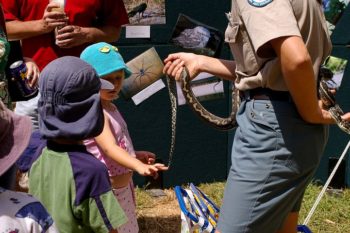 I Am Part Horse! By Mary Ann Burke
I Am Part Horse! By Mary Ann Burke
INTRODUCTION: GenParenting bloggers will periodically feature select children’s stories with educational and social-emotional growth themes. I Am Part Horse was written to support second grade learners. Students will complete rattlesnake science projects and research online informational text to write a rattlesnake report.
Yikes! My Snake Bite!
On a hot summer night, I felt a harsh stinging bite on my foot while walking on my front porch. Jumping up and down and crying in pain, I screamed, “SNAAAKE!”
My dad came running. “Stop jumping around, Nellie! Try to stay calm so the poison will not spread in your body.”
We anxiously watched as the tan, diamond-patterned, 18-inch baby rattlesnake slithered off the front porch and dropped into the garden below.
When Dad phoned 911, the dispatcher ordered, “Have your daughter sit quietly until the fire department and ambulance arrive at your home to transport her to the hospital.”
As my dad cuddled me while waiting for the ambulance, I cried, “Dad, my foot hurts and it is burning. My mouth feels prickly. When I try to breathe, my chest aches.”
When the paramedics arrived, my foot had swollen to the size of a balloon! They carried me out of my house on a stretcher and placed in the ambulance. By the time we were on the way to the hospital with sirens blaring, I felt even worse!
I Become Part Horse!
At the hospital, my doctor explained, “We have ordered antivenom medicine to make you feel better. I will give you a painkiller shot that will make you drowsy and help with the pain.”
The next thing I remembered, I was confused and my head felt heavy. Dad was sitting by my bed. “What happened? Where am I?”
Dad hugged and reassured me, “You were asleep for a full day. Your doctor stayed with you all night. He will continue to check on you today. The doctor had to order medicine from another hospital. This medicine was an antidote to fight the venom in your body. It was made from the blood taken from a horse.”
“What! I cannot believe that I now have part of the blood of a horse in my body. I am having so much trouble moving my leg!”
Dad explained, “Nellie, I will take you to physical therapy so you can learn how to walk again. The snake venom in your body causes nerve damage. Your doctor can fix the nerve damage. You are going to get better!”
I Hobbled Back to School!
After a couple of weeks of resting my injured foot, I hobbled back to school. As I entered my classroom, Sophia hugged me and exclaimed, “Where have you been? What happened to you?”
Before I could answer, Manuel patted me on the back. “Yo! It’s not fun without your silly jokes, Nellie!”
Then I proudly explained to my class, “I was bitten by a rattlesnake. My medicine to fight the poison was made from horse blood. Now I am part horse!”
“Whoa Nellie! What are you saying?” exclaimed Sophia and Manuel as they looked at me in shock and wonder.
Our teacher, Mrs. Hecklebee, quickly reassured us, “Learning about snake bites and antivenom medicines would be a great project for our second-grade class. Rattlesnakes are not a problem for most kids. But they are a big deal for us because we live near lots of rattlesnakes. We can learn how to protect ourselves from snake bites when playing outside.”
What is Antivenom Medicine?
Mrs. Hecklebee read us a story about rattlesnake bites and explained, “Antivenom is a medicine that is made to kill the rattlesnake’s poison in a person’s body. It is made by injecting small doses of venom into an animal over time. The animal is not hurt. When the venom is mixed in the animal’s body, the animal’s body will produce antibodies. These antibodies are made to destroy the venom. They are collected from the blood of the animal and are used as the medicine to help people get better from a rattlesnake bite.”
I added, “Sheep, goats, donkeys, and rabbits are some of the animals that are used to make this medicine. My antibodies were made from the blood of a horse. That is the way I became part horse!”
Lilia shockingly looked at me and exclaimed, “Are you going to start walking like a horse when your foot is better?”
“NEEEIGH! And I am being taught how to gallop in my physical therapy sessions as I learn to walk again.”
SIDEBAR HOMEWORK ASSIGNMENT:
Think about the different animals that are used to make antibodies for rattlesnake bites. Then complete the following activities:
- Draw a picture of one of the animals that help make the antivenom serum.
- Write a sentence or report describing how the antivenom is made in the animal for medicine.
How Can We Protect Ourselves From Snake Bites?
We each shared our picture of an animal that could be used to make antivenom. Gerald drew a picture of a donkey and Lilia created a picture of a sheep getting a shot of venom from a rattlesnake. I drew a picture of a horse and named him Lucky because I am lucky to be alive and well.
Mrs. Hecklebee stated, “Rattlesnakes and other venomous snakes do not bite unless they are afraid they will be hurt by a person or large animal.”
She read a story about how to stay safe from being bitten by a rattlesnake or other venomous snakes. I learned most bites happen when people accidentally touch the snake with their foot while hiking or with their hand while gardening. We also brainstormed what we could do to avoid a venomous snake bite.
Sophia said, “My mom rakes the weeds in her garden before she starts pulling them with her hands to scare off any rattlesnakes.”
Manuel stated, “My dad and I love to go hiking in the woods and look carefully for snakes.”
I explained, “My dad now sweeps the leaves off the front porch even in the summer in case there is a rattlesnake.”
SIDEBAR HOMEWORK ASSIGNMENT:
Talk to your parents about how to make your home safe from poisonous snakes and brainstorm safety rules for your home:
- Write one rule to keep your home safe from poisonous snakes.
- Draw a picture of you and your family using that rule at your home.
We shared our homework assignments with our classmates. Jasmine explained, “My mom was bitten by a rattlesnake when she was a little girl. She does not know what kind of medicine was given to her to make her better. She was very happy when I told her that we were learning how to stay safe from rattlesnake bites. Her suggestion was to respect the snake. Give it the space it needs to escape and observe the beauty of the snake after it returns to its home in nature.”
I love to hike, but I am careful and respect the beauty of all creatures in the forest. I will always love horses because they are beautiful animals that help save people’s lives.
Bibliography
Burton, J. A. (1998). The book of snakes. Edison, NJ: Chartwell Books.
Dussling, J. (1998). Slinky, scaly snakes! New York, NY: DK Publishing, Inc.
Ellis, E. (biologist personal communication, January 14, 2023).
Gentry, D. (biologist personal communication, January 11, 2023).
Kimura, S. (biologist personal communication, January 14, 2023).
Jackson, T. (2001). Nature’s children. Danbury, CT: Grolier Educational.
Julivert, A. (1993). The fascinating world of snakes. Hauppauge, NY: Barron’s Educational
Series, Inc.
Llewellyn, C. (1997). I didn’t know that some snakes spit poison and other amazing facts about
snakes. Brookfield, CT: Copper Beech Books.
Main, D. (2011, July 12). Popular Mechanics [Blog]. Retrieved November 18, 2022 from
Markle, S. (1995). Outside and inside snakes. New York, NY: Simon & Schuster Children’s
Book Publishing Division.
McCarthy, C. (1993). Poisonous snakes. New York, NY: Shooting Star Press Inc.
Montgomery, S. (1999). The snake scientist. New York, NY: Houghton Mifflin Company.
Norwich, G. (2011). Snake-A-Phobia. New York, NY: Scholastic Inc.
O’Hare, T. (2005). Rattlesnakes.Vero Beach, FL: Rourke Publishing LLC.
Parsons, A. (1990). Amazing snakes. New York, NY: Alfred A. Knopf, Inc.
Pringle, L. (2004). Snakes! Strange and wonderful. Honesdale, PA: Boyds Mill Press, Inc.
Reinhart, B. (molecular biologist personal communication, February 17, 2023).
Richardson, A. (2003). Rattlesnakes. Mankato, MN: Capstone Press.
University of Melbourne (n.d.) What is antivenom? Retrieved November 21, 2022 from
Venn, C. (2002). Rattlers and other snakes. Chicago, IL: World Book, Inc.

Mary Ann Burke, Ed.D., Digital Education Expert, is a substitute distance learning teacher for Oak Grove School District in San Jose, California and the author of STUDENT-ENGAGED ASSESSMENT: Strategies to Empower All Learners (Rowman & Littlefield: 2020). Dr. Burke creates digital language arts and substitute teaching K – 12 activities for teachers and parents. She is the Cofounder of the Genparenting.com blog. Burke is the former Director II of Categorical & Special Projects for the Santa Clara County Office of Education that supports 31 school districts serving 272,321 students in Santa Clara County. She is also a previous Director – State & Federal Compliance for Oakland Unified School District, the former Director – Grantwriter for the Compton Unified School District, and was the initial VISTA Director for the Community Partnership Coalition in southern California. Much of her work focuses on creating innovative digital trainings and partnership programs for teachers and families to support students’ learning. These programs were featured as a best practice at a National Title I Conference, California’s Title I Conferences, AERA Conferences, an ASCD Conference, the NASSP Conference, and statewide educator conferences.
 10 Cheap Summer Activities for Kids
10 Cheap Summer Activities for Kids
 Summertime Social-Emotional Learning Routines
Summertime Social-Emotional Learning Routines Behavior Assessments Support Children’s Learning Successes
Behavior Assessments Support Children’s Learning Successes Advocating for Your Child’s Special Education Needs
Advocating for Your Child’s Special Education Needs